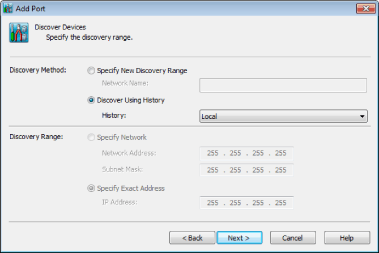Searching for a Device
Set the device search range in the [Discover Devices] dialog box. Select [Discover Devices on Network] in the [Method to Add Port] dialog box, then click [Next] to display the search range dialog box.

|
[Discovery Method]
|
Specify the search range from [Specify New Discovery Range] or [Discover Using History].
Select [Specify New Discovery Range] when specifying a new network name and performing a search by specifying a range.
Select [Discover Using History] when searching the local network or the network used for past searches.
|
|
[Network Name]
|
When selecting [Specify New Discovery Range], enter the name of the network for the new search and specify the search range. You can enter a maximum of 16 double-byte (32 single-byte) characters. The network name is case-sensitive.
|
|
[History]
|
When [Discover Using History] is selected, choose the search range from the local network or the network used for past searches.
You can select the search range from the most recently used 5 search ranges.
|
|
[Discovery Range]
|
Specify this by selecting [Specify New Discovery Range] in [Discovery Method]. If searching by specifying the network address and the subnet mask, select [Specify Network]. If specifying the IP address as the search range, select [Specify Exact Address].
When [Discover Using History] is selected, you cannot specify the search range.
Example. When searching devices with IP addresses ranging from 192.168.1.1 to 192.168.1.254.
[Network Address]: 192.168.1.0
[Subnet Mask]: 255.255.255.0
|
|
[Network Address]
|
Specify the network address to search by selecting [Specify Network] in [Discovery Range].
|
|
[Subnet Mask]
|
Specify the subnet mask of the network address to search by selecting [Specify Network] in [Discovery Range].
|
|
[IP Address]
|
Specify the IP address by selecting [Specify Exact Address] in [Discovery Range].
|
|
[Next]
|
Device search starts. When the search completes, the [Select Device] dialog box is displayed.
|
|
Note
|
|
When you enter characters used in other languages or countries/areas than specified in the OS settings, the characters may not be displayed correctly.
When you specify [Network Name], you cannot use a Tab code and following characters:
" ' ; , = [ ]
|